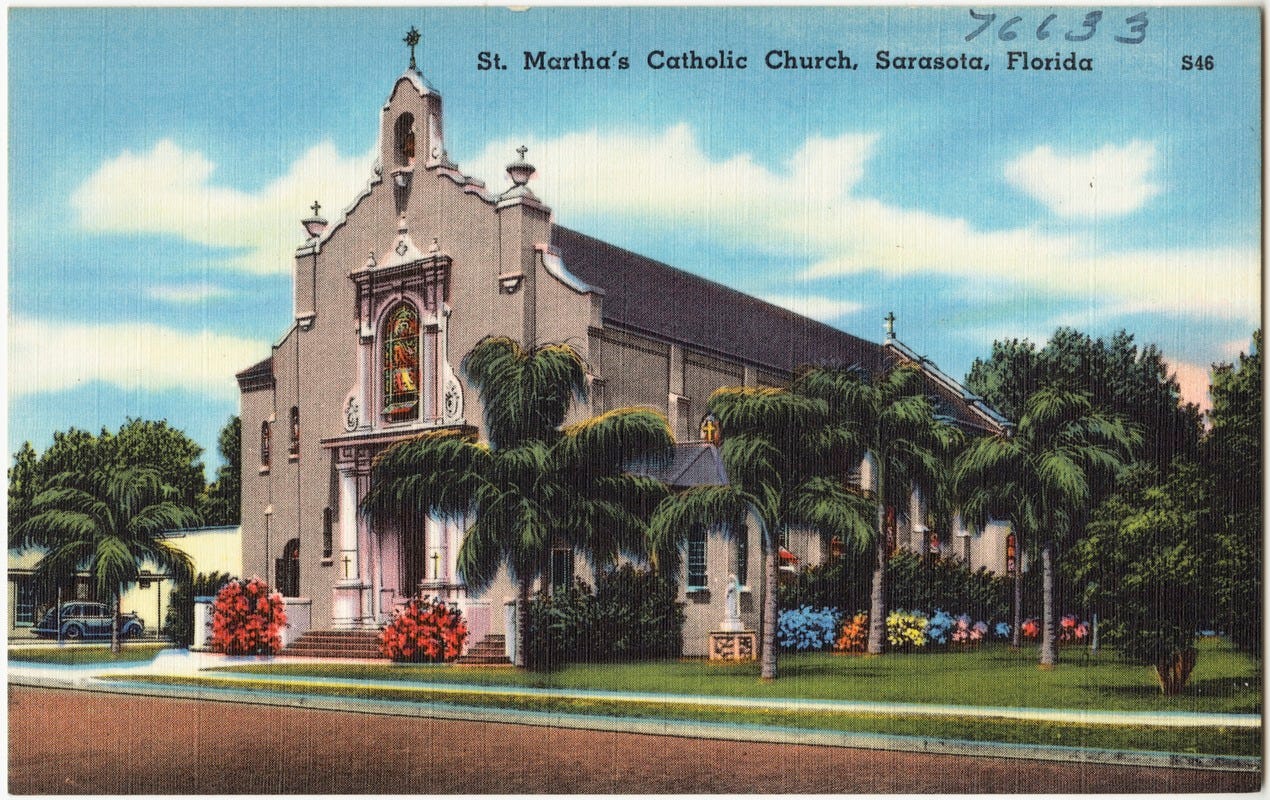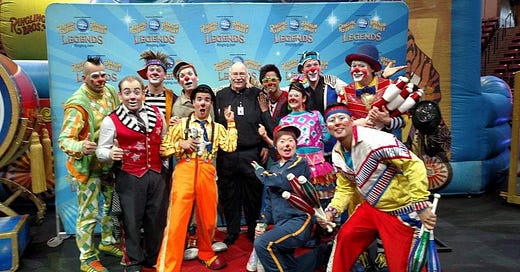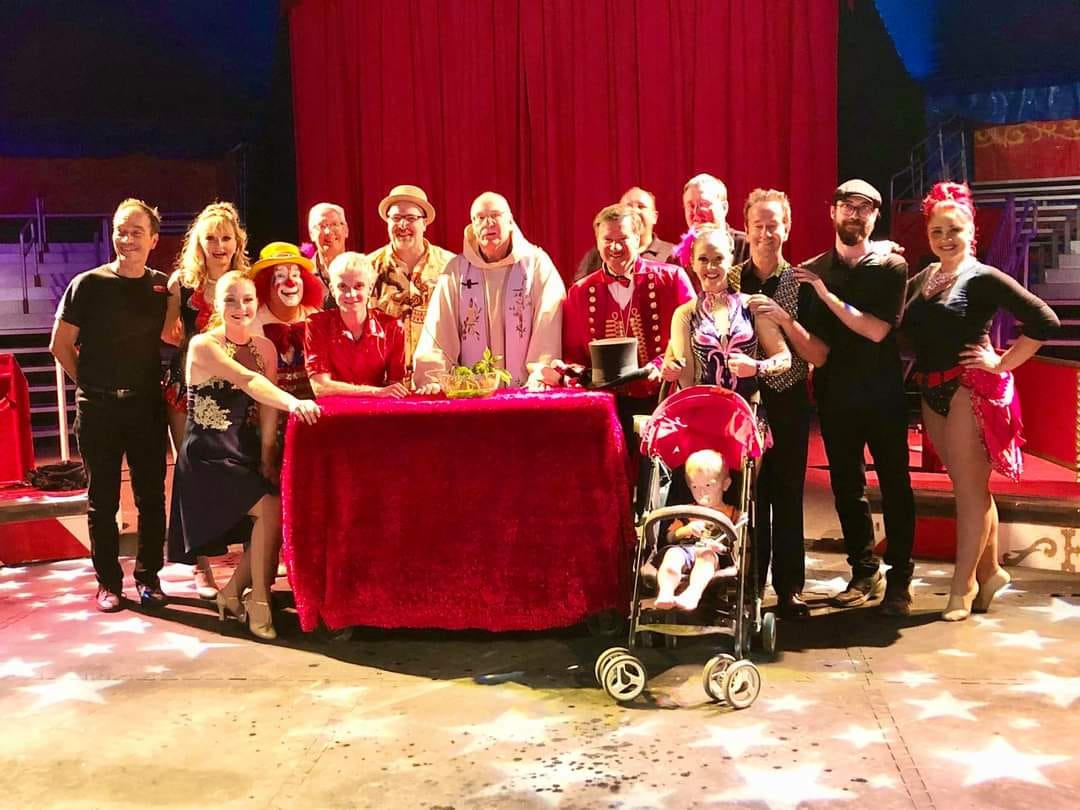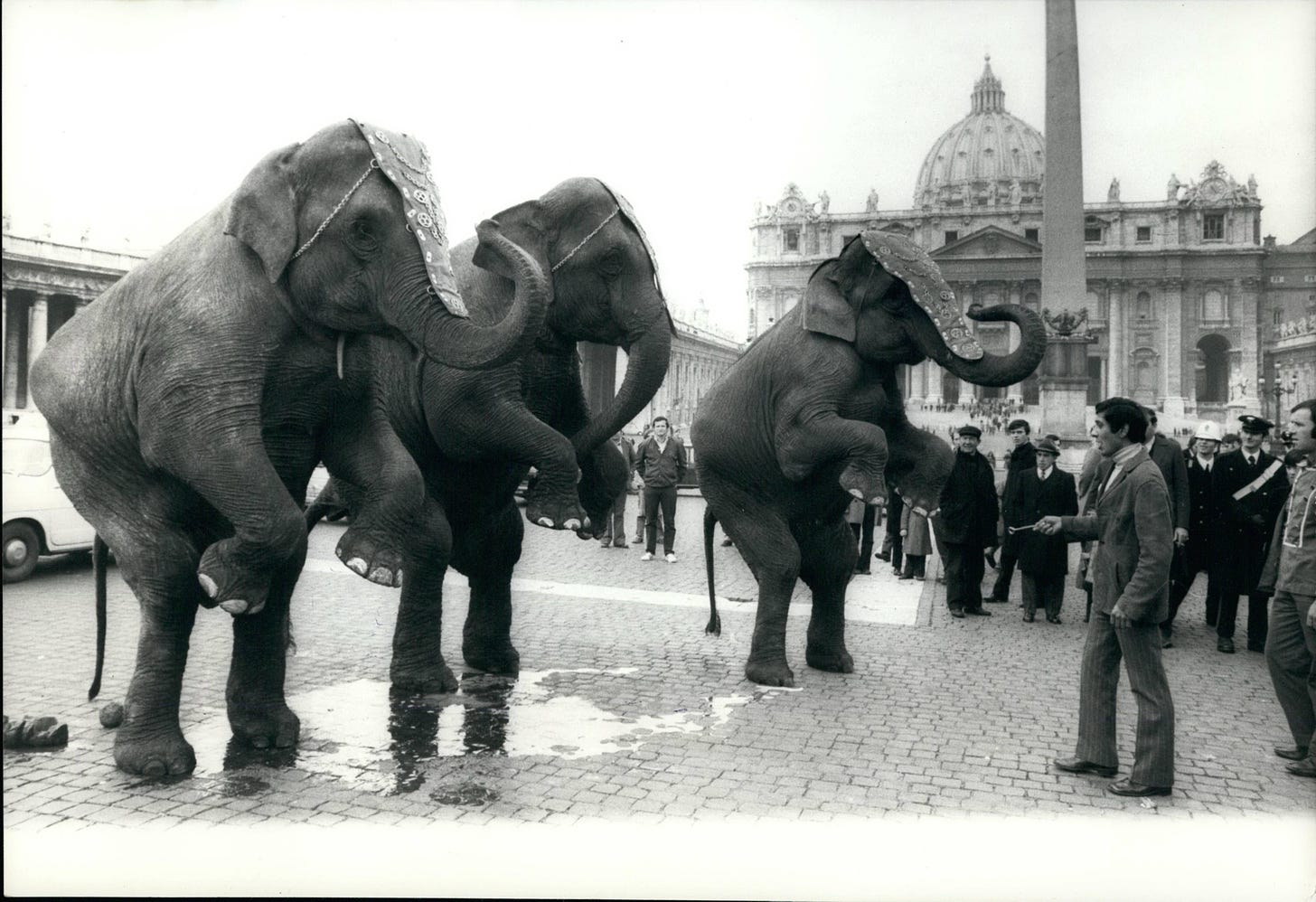
Father Frank Cancro has one of the most unusual priestly apostolates in the United States: He prays at the circus.
Cancro is the National Circus Chaplain for the USCCB’s Circus and Traveling Show Ministries. Retired from pastoral ministry in the Diocese of Charlotte, Cancro spends much of his time each year on the road, traveling with one of the 40 active circus troupes at work in the United States. The priest also coordinates priestly ministry for rodeos and other traveling shows.
Father Cancro talked with The Pillar about his unique ministry, and his unique preparation for the call.
This interview has been edited for length and clarity. You can listen to a complete interview with Fr. Cancro in this bonus episode of The Pillar Podcast.
Father Cancro, you work as the national circus chaplain. What is that?
I work with a small group of individuals who have made the commitment to provide pastoral care and services to folks in the circuses of the United States.
There are about 40 traveling circuses in the United States, and they involve large numbers of personnel, both performers and workers. And our job is to be a pastoral presence to all of those folks around the country.
People who are stationary in a town need pastoral care, and the same is true for all of those who, as we say in the business, “travel down the road without a zip code.”
And what makes you the national circus chaplain? Who appoints you — how do you get the gig?
We operate under the auspices of the Secretariat for Cultural Diversity of the United States Conference of Catholic Bishops. The USCCB has had a focus on traveling shows and travelers, along with migrants and refugees, for really quite some time. And that flows out of the universal Church’s ministry to those same populations.
So it’s through the secretariat — and specifically the USCCB’s office of pastoral care to migrants, refugees, and travelers — that our operation exists, and that we work with circus folks.
You are a diocesan priest, retired from full-time parish ministry as a pastor. How did you get involved in this kind of work?
Well, since about 2010 I’ve been involved in circus ministry. But, you know, before I was ever in the seminary, more than 50 years ago, I actually was a circus clown. I did some circus work for a few years — I was not particularly great at it, or well-known for it, but it’s something I always wanted to do. And I did.
And then when I moved out of that, I moved on to other things, and eventually discerned a vocational call and entering into the seminary. And by that point, most of this past of mine was far are behind me, and I didn’t see it as as something that was having a tremendous influence on my life.
But when I was a pastor in Belmont, North Carolina, I was given in 2009 a missionary for our annual mission co-op collection, and it was a missionary who came from the circus and traveling show ministry. It was a sister — a Missionary of the Sacred Heart, Sister Dorothy, who was assigned to come to my parish and beg for a weekend — to solicit funds for the ministry. I was grateful to have her.
I honestly think the person in my diocese who did the assignments did so knowing my own background, and that I would be open and amenable to having Sister there, which indeed I was. … Well, she noticed, on my office wall, a photo of me as a clown from an old magazine cover that I had done. My mother had had that cover framed and after she died I inherited it.
When Sister Dorothy asked about it, I had to tell her my story, you know. And then two weeks later, I got a letter in the mail from Washington, DC, inviting me the annual meeting of the circus and traveling show ministry. And I became one of the small group of people working with the circuses.
How did you balance that with pastoral work?
At that time, there were a few priests involved, all of us were pastors or had pastoral responsibilities. So we tended to rely on the sisters — there were two sisters at the time who traveled full-time on the road and lived in an RV. And so they’d spend a month or two at a time with an individual circus. And then as needs came up, we priests would figure out who could go where, and when — and so for me, at first, that was four to five days a month.
One of my desires in retirement was to spend more time in the ministry, especially around holidays. One of the things that certainly’s difficult for circus folks was that they performed during holidays, but we would never be available to provide services for them.
So the exciting thing about retirement is that I could spend more time at Christmas, Easter, and at other significant times, being on the road, with the shows. And eventually I became responsible for coordinating this ministry.
Father, we need to come back to something. You were a circus clown. What was that like?
Well, I was very young at the time, so I was far more adaptable. You know, living on the road is a challenge, but when you’re young, you can adapt to these things.
It was always exciting. You were always learning new things. And on a circus, you’re working sometimes three shows a day, maybe four, and in some circuses you’re in and out of a place within 24 hours. So you set up, have the performances, meals, tear-down, prepare the next day, set up again, and it just goes on and on, so it can become rather routine. And it can sometimes wear on you as well.
So like any job you try and find ways to balance that for yourself. And for me, what balanced it was being able to learn different skills, and certainly to meet different people. I certainly visited a lot of very small towns in the United States that would normally not be seen by tourists, and I know some cities more by the interiors of their arenas than I do by any of their historical markers.
To hear much more about the history and cultural significance of clowning around, listen to this full interview with Fr. Cancro.
Tell me about your congregation.
So they’re a pretty diverse crowd, to be honest.
They are young and old. There are certainly a lot of younger performers in circuses simply because the kinds of things they do require bodies that have to be far more agile, but there are some families that are six and seven generation circus families. And when mom retires from trapeze, she might work in wardrobe while she has two younger adult children working on the bar — in the ring. You have families from different age groups working together.
They also come from a variety of places. One of the reasons that Catholicism has been prominent in the American circus is that we drew performers and their families heavily from Europe and from South America. And those families, at least culturally, were Catholic. So there has always been a fairly large Catholic presence within circuses.
On Ringling Brothers, when it still existed, that was a fairly large show, and you’d have as many as 24 different countries represented, and as many languages represented in one group, with 300 or 400 families [in one show].
There is a new group of performers coming along too…not so much performers, but workers who are not really circus-connected, this is their first job, or their first entry into the world of circuses. And that’s a new experience for us, and for them too, because they’re not as aware of the culture…you know, there’s a language, there’s a pace, a rhythm to circus life that they have to learn to get used to. The circus is a lifestyle, and that’s been interesting, to help [initiate] them into this more traditional, familial focus of circus culture that exists in the United States.
And our ministry is not just to the Catholic performers. The Catholic Church is the only denomination that has had an ongoing and regular ministry to circus people in the United States, and has done it for more than 100 years. So we’re really trusted by circus people, and by the circus owners — we can be present on the shows, and for that reason they trust us to be present to everybody. And so we really do have a ministry of presence, not just to Catholics, but to everyone else on the show as well.
Obviously, living in an itinerant community can be hard on marriages, and there’s a perception it might also lend itself to substance abuse or other challenges. What are some of the pastoral issues you encounter ‘on the road?’
So the same that you’d find, I think, anywhere.
But you’re on target. Certainly issues with alcohol or drug abuse can be problematic, especially with young people who might have a lot of time on their hands and may not be the best at handling relationships and the other kinds of ups and downs that are part of of everyday life.
The normal relational issues, people getting mad at each other, people falling in and out of love with each other, not knowing what to do with those kinds of realities, they become a part of what you deal with also.
The joys of raising family, the tragedies of losing people. So weddings, funerals, births — all of those things are certainly a big part of experiencing life with the folks on the circus.
And for the Catholic population, dealing with the sacramental moments that are part of their life, as well as doing what you can to help provide an adequate formation, especially for sacraments in individual family lives.
Do circus performers generally earn a just wage, or do they find themselves living on the edge?
Well, pay has gotten better certainly as time has gone on.
But the fact of the matter is that these two years have been a perfect example [of the fact] that if you’re not performing, you're not getting paid. So, you know, a lot really depends on how solid your show is, and how successful your house is in terms of bringing people in.
Some acts can be paid significantly — good money. Others make a minimum wage — enough to survive on. A lot depends on what it is that you are doing, but it’s far better than it was, even 10 years ago.
And you know, some circus jobs are union jobs. So there’s a certain requirement of both pay and benefits connected to those.
You know, in our ministry, we run a mobile home park in Florida for retired circus folks who don’t have the means to survive in any other way. So on a sliding scale, we provide a place for them to bring their mobile home and to live, because they didn’t make a lot of money or didn’t have a retirement plan or, the way things worked out, they didn't have the resources to be able to do that. So it’s across the board, but these days it’s certainly better than it was.
And what about health insurance?
There is health insurance, both held by individuals and sometimes the show provides it — because insurance for the kind of activities you do is sometimes more expensive than just normal health insurance. So there are special companies that do insurance for circus performers.
Can you talk about your sacramental ministry? I mean, do you find yourself doing weddings very often? Do you have confirmations?
Again, it’s pretty much the same as you find in any parish.
You have an ongoing schedule of baptisms, and first Eucharist, and confirmation and weddings. They’re pretty much all the same kind of routine and a lot depends on what particular show you’re with and what the mean age of the group might be.
We had a large number of baptisms, this last year, especially through the Midwest and the far West in the country. Not so many in the East, but then again, a few more weddings on this side of the Mississippi this past year than maybe in the two years prior to that.
But the regular sacramental life of a parish is what you would see reflected in the life of the circus. Sometimes it doesn’t always happen at the same moments. So not every kid is seven or eight years old when they receive first Eucharist, because formation, sometimes for us, might have to take two whole seasons rather than one semester or two. And we rely heavily now, especially, on social media for preparation materials and for dialogue between individuals and getting people ready.
As a canonist, I wonder about how the sacramental records work for people in the circus, because they’re itinerant, and so it’s not clear where they might be considered parishioners.
Well, the [Vatican] Congregation for the Propagation of the Faith has, kind of, set up a model for itinerant missions, and the circus missions around the world have always followed those same directives. The national circus parish is St. Martha Church in Sarasota, Florida, and there’s a history to that, and that’s the place where all of our sacramental records are kept.

Ok, so that parish is effectively then kind of a personal parish for circus people?
Yes. I’m a member of the staff of St. Martha’s, even though I don’t physically live there, and I have faculties out of the Diocese of Venice, and so my ministry with circus folks generates itself out of that.
St. Martha’s is the oldest church in Sarasota, and it exists on land very close to where Ringling Brothers had their winter quarters. And so Ringling Brothers and their performers essentially built St Martha’s. It has had a connection to the circus for about 100 years now. And so the bishops’ conference designated it the national circus church.
What is your day-to-day life like when you’re traveling with a circus? And how does your own spiritual life fit into that life? Is it unusual, for a priest, not to have the Blessed Sacrament nearby when you’re traveling?
Well, up until the time the sisters left the road, we did keep the Blessed Sacrament in the RV, and there was a small chapel that was always part of that. So, that’s only been unavailable in the last two years, when the sisters have left the road. The RV that we used unfortunately is in disrepair to the point that we’re not going be able to take it back on the road again.
But for me, to be very honest, one of the things about circus people is their days are late. So the first show will never be before noon, which means that late morning is when things just start to gear up on a circus lot. Now they’ll go until after midnight, you know.
When Ringling Brothers ran a school, school started at 4:00 PM, and went for five hours after that. That’s the normal routine of most folks’ lives.
And for me, what that meant is that I have had the whole morning to myself, for prayer, and reading, and reflection. And if there was a local parish in town, and I knew they had a daily Mass, and I had a vehicle with me, I would go over to assist at Mass, if I weren’t going to be saying Mass on the site.
I don’t necessarily say Mass [publicly] everyday [on site], a lot depends on the size of the troupe, how many Catholics are there, how many are free to come. Those things would determine the Mass schedule. Weekends we have one or two Masses, but during the week I’d either go someplace, or I might say Mass by myself, or if I was with the sisters, the three of us would gather for the Eucharist.
But the morning is always a cherished time for prayer. I am, quite frankly, able to pray in a more concentrated way on the road than even in parish ministry, simply because I know that there’ll be no disturbance from anybody, because they’re all still asleep.

Father, I found out about your ministry because I was researching a circus performance at the pope’s Wednesday audience last month. Those performances happen fairly often. A lot of people see them, and think it’s kind of hokey or weird for the Church to do this. What is your take on those things?
You know, I honestly think it has a lot to do with circus people who understand themselves as not having many roots, but seeing the Holy Father certainly as part of their rootedness.
[The custom] started with Italian circuses, but through history, other big circuses have come as well.
But, you know, [for circus people] he really is “Papa.” And that notion of rootedness that can be found be in the Church, that’s a real drive for people. I think a connection to the Holy Father from otherwise rootless people has always kind of been a very interesting symbol and circus people fit that bill.
I have a friend who has clowned in the United States, but he’s from Italy, and his family owns two circuses in Italy. And one year, their circus performed for the Holy Father.
And, just talking to him about his family’s reaction to it, it was very much like a sense of being connected to home, and to what really counts.
And for folks who don’t have a rootedness, and who have to rely so often on the applause and the laughter of others to even get a sense of self, that becomes a very important moment of depth.










This was a surprisingly interesting and great interview.
I absolutely loved that interview